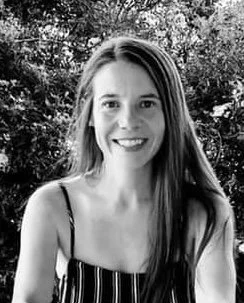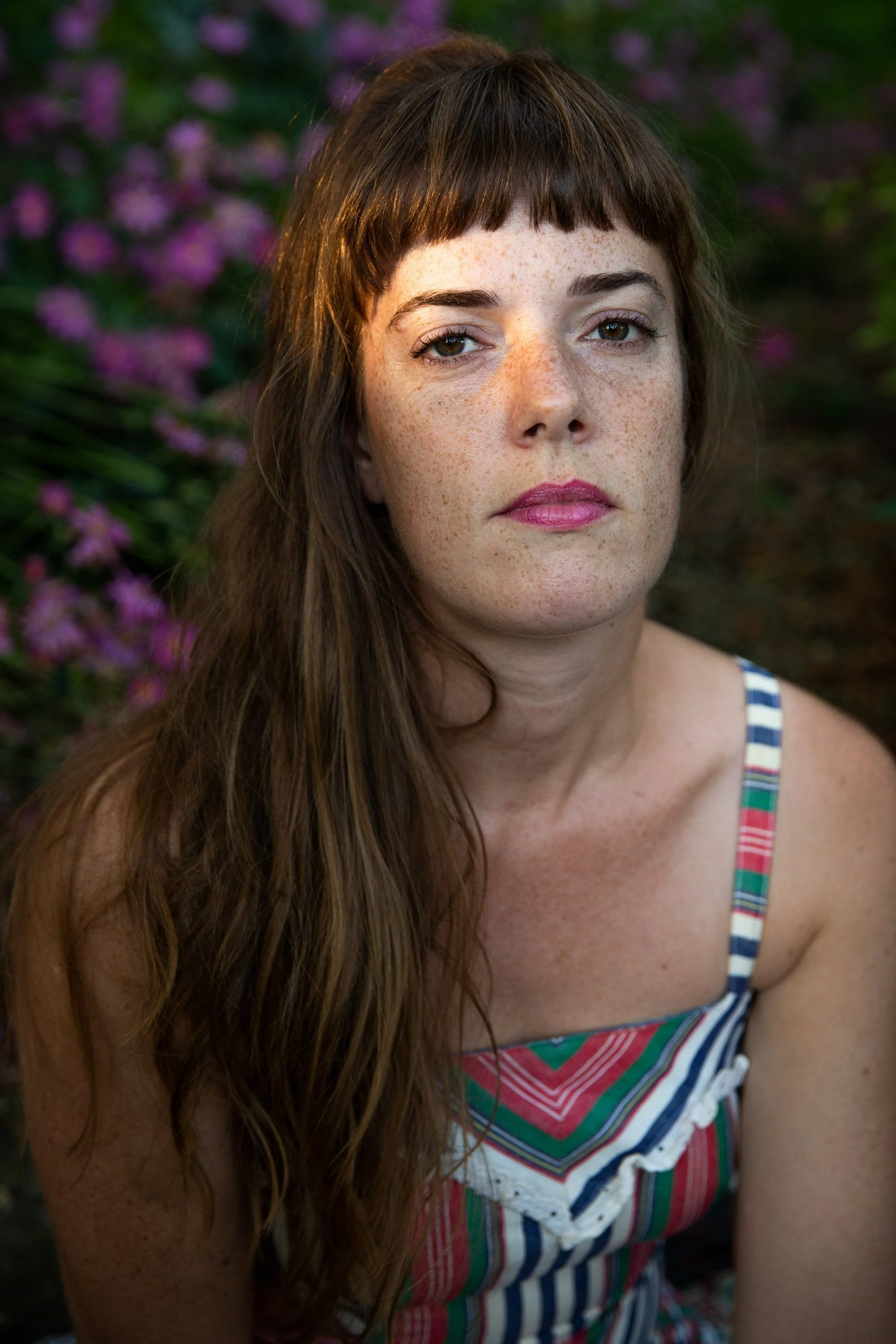2022 heartwood poetry prize
judged by 2021 winner Bill King
Winner: Hollie Dugas
If I Were Android
love’s algorithm would be enough.
I’d let go of my plush red skin,
leave sex and fickleness behind,
and turn my humanity inward
toward processor. There’d be
nothing left for me to figure out.
I’d look into your eyes and repeat
program: Love is like a trip
to the moon with no return flight—
and I’d tread carelessly
by your side through
the unknown, ignorant of labels
and death. I’d live uncannily,
linger at paintings of women
in wooden rowboats.
I’d have no real name, only
automated body and candor.
And I’d follow your instruction
thoughtlessly, without question,
count your preset words and store
them in my mechanical brain
like little signs. I’d know you
and never understand—my heart,
practical, an anthology of circuit
boards, an excess of smoke,
my perfect timeclock ticking.
Hollie Dugas
Holly Dugas lives in New Mexico. Her work has been selected to be included in Barrow Street, Reed Magazine, Crab Creek Review, Redivider, Porter House Review, Pembroke, Salamander, Poet Lore, Watershed Review, Mud Season Review, Little Patuxent Review, The Penn Review, Chiron Review, Louisiana Literature, and CALYX. Most recently, her poem was selected as winner of the 22nd Annual Lois Cranston Memorial Poetry Prize at CALYX. Hollie has been a finalist twice for the Peseroff Prize at Breakwater Review, Greg Grummer Poetry Prize at Phoebe, Fugue’s Annual Contest, and has received Honorable Mention in Broad River Review. Additionally, “A Woman’s Confession #5,162” was selected as the winner of Western Humanities Review Mountain West Writers’ Contest (2017). Recently, Hollie has been nominated for a 2020 Pushcart Prize and for inclusion in Best New Poets 2021. She is currently a member on the editorial board for Off the Coast.
1st Runner-Up: Nancy Beauregard
Write This Down
before you forget, before I forget—she says,
the stories of our mothers in a house turned upside down,
walls torn open to replace leaky heart valves,
menstrual pads stuffed inside to hold back the flow
if pipes burst in a six-below La Niña winter.
Our lives spill intestines on every surface:
pots and pans, glass pie plates,
an old flour tin filled to the brim
with Mom’s favorite cookie cutters,
an industrial mixer moved to the top of the dryer
because there’s no other place to make banana bread.
A curio cabinet older than my grandfather is emptied of papers,
books on spiders, blue-bellied lizards, cactus and desert flowers,
secrets locked away behind glass with a skeleton key
now cover tables where dolls gossip next to pathos plants.
A child’s porcelain horse lies on a bed with its glued broken leg,
stares out the window at graying skies,
wishes it could run in my backyard,
graze on the dying clumps of grass,
leap over a seven-foot coyote fence.
I tell my daughter we need to get rid of all this junk,
throw it out, have a yard sale.
She picks up a brown teapot, asks about the missing lid
and I repeat the story my mother told me
of her mother who brewed tea for my grandfather every night
when he came home from the factory
to stop the migraines that ate at his soul—
the ones that turned out to be cancer.
She picks up a gold thimble—finds my name scratched inside
from when I was twelve,
places it on her finger,
touches mismatched cups and saucers,
an old leather-bound book
her grandmother said was worth something,
recipes for making French meat pies,
baked beans that must bubble for hours
in molasses and bacon fat,
a crystal hummingbird that wants to fly out a window,
migrate to Mexico.
My daughter holds each piece,
feels the edges of time and space,
tells me we cannot get rid of a single thing,
she says, write this down,
before you forget, before I forget—
the stories of our mothers in a house turned upside down
Nancy Beauregard
Nancy Beauregard lives in Santa Fe, New Mexico, with her daughter and two feisty Maine Coon cats. She holds a BFA from the Institute of American Indian Arts and an MFA in Creative Writing from Western Colorado University. Her recent work has appeared in the Santa Fe Literary Review, Sky Island Journal, and in her poetry chapbook, I Heard a Train. Accolades include first place in the 2022 Eugene V. Shea National Poetry Contest. Follow her on Instagram @murderedinanovel.
2nd Runner-Up: Anna Laura Reeve
White Oak Sink
Two miles up the gap, an unmarked manway
signals a branching trail bowed beneath dense
rhododendron. Filtering through sunny lowland
and hemlock glade, it descends into the sink.
In the valley, karst formations jut by rivers,
opening wide cavemouths, but soft strata thins
in the mountains, whose battered pre-cambrian crowns
lift still—though less than in the last aeon.
Glacier ravined them, drawing paths buffalo beat
first, then mothers and long-haired sons of Catawba
and Unicoi, braiding trails into the Great Warpath
where the tread of European settlers and the lowing
of their vigorous cattle suddenly bloomed like
a flower of death, even here, where a Pliocene
cavern collapsed and filled with leaflitter.
The bowl’s rim flattened. Opened, like a flower.
Once, a girl sang down in the sink. Her lover
listened—stilled, like every wild thing listens—
lying with his face under a mayapple’s flat leaf
and watching it tremble. The sky’s silence
ballooned upward, the music intimate as a kiss
behind the ear. Once, a point plotted on the spiral
of time. Once, meaning a stratum of bedrock,
limestone dissolving in rainwater, what was once
stone freed to rush down an underground river.
Before mountain people were forced from the sink
to make way for a national park, their grand-daddies
split and drove out the Cherokee Nation, whose
lodge poles burnt to pure carbon. We hear fugitives
remained, starving in the hollows of their own land
as settlers had starved before them. Who among
these hungry people collected the spicebushes
towering here, the woodland phlox, mayapple,
wild geranium, foamflower, and wakerobin?
Great white trillium forming colonies with Bishop’s
cap like white roses in baby’s breath. Yellow
trillium bracts dotting drifts of phlox and ferns—
inedible, beautiful. This is what the universe does:
push the living together with ice, ocean, need.
This is what the living do: bring flowers down
from the ridge to mass together, so they’re visible
from a kitchen window. Put the flowers in a bowl.
Heap it high with flowers. Limitlessness—a desire
deep in the throat for people who know how to live
on nothing.
Anna Laura Reeve
Anna Laura Reeve is a poet living, gardening, and getting into tarot near the Tennessee Overhill region, historic land of the Eastern Cherokee. Previous work of hers has appeared or is forthcoming in Beloit Poetry Journal, Rust + Moth, Terrain.org, Fourteen Hills, and others. She is a semifinalist for the Adrienne Rich Poetry Prize, a finalist for the Ron Rash Award, and her debut poetry collection, Reaching the Shore of the Sea of Fertility, is forthcoming from Belle Point Press. Read more: www.annalaurareeve.com


